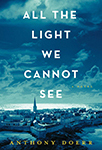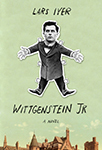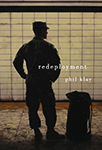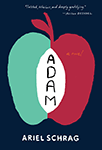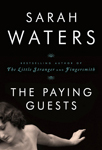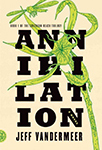by Jesse Ball
30% OFF at Powell’s »Meg Wolitzer: I had a realization, as I made my way through these two big, impressive books: Each one appealed to a different side of my bifurcated taste as a fiction reader. I love when I read a novel in which style matters a lot, and sometimes even becomes dominant. All the Light We Cannot See by Anthony Doerr falls into that category for me. It relies on lyricism for some of its energy, employing present-tense chapters that are unusually short and have intriguing names: “Don’t Tell Lies”; “He Is Not Coming Back”; “Twenty Thousand Leagues Under the Sea.”
But I have another side as a reader that specifically seeks out a sense of “felt life,” which relies less on style and a fine chisel than on an ability to create a world made up of people interacting messily, and to make the reader feel that she too lives in that world. And this was the case with The Paying Guests, a less burnished novel on a sentence-by-sentence basis, but one whose power comes from its fully realized view of its characters and their circumstances.
All the Light We Cannot See is a book about which, pretty much since it’s been published, people have been asking one another, “Did you read it yet?” I was curious to know just what the spell was that the book had over its admiring readers. The rough description had kept me from jumping in when the book first came out: blind girl/German boy/World War II. I feared I would find it sentimental, and that I would end up being disappointed. I like nothing more than loving a book and being able to feverishly discuss it with other people. This was my experience, in recent years, with Edward St. Aubyn’s The Patrick Melrose Novels. Talking about those books was in a way like being in a club: Everyone I knew who had read them seemed to love them as much as I did, admiring the style of the writing but also enjoying being inside the big, overarching “project” that St. Aubyn had undertaken in creating a suite of semi-autobiographical books that wrestled with ideas about one’s own personal history, and the possibility of recovery from that history. Reading is of course solitary, but talking about books isn’t, and love-fest conversations in particular can remind you of the reading experience all over again.
The Doerr people seemed to have their own enthusiastic and now enormous club. The novel is lush, granular, and sweeping, and the writing is frequently beautiful, making me pause in pleasure, re-reading:
Skim ice has formed atop puddles in the gravel paths. Whenever she finds some with her cane, she stops and bends and tries to lift the thin plate without breaking it. As though raising a lens to her eye.
While the elegant simplicity of the prose is often used to great, even amazing effect, occasionally the writing can seem repetitive. The following chapter beginnings occur sequentially:
“Sergeant Major Von Rumpel climbs a ladder in the dark.”
“Bernd the engineer squirms in pain, grinding his face into the back of the golden armchair.”
“When Marie-Laure wakes, the little model house is pinned beneath her chest, and she is sweating through her great-uncle’s coat.”
I was occasionally made restless by this sort of deliberate sameness. Yet it can’t be denied that the short, often lyrical chapters are unusually engrossing as they pile up, and they end up telling a dramatic story that isn’t, in fact, sentimental.
The Sarah Waters novel does entirely different things from the Doerr. The Paying Guests, also historical, is set in London in the 1920s, a changed landscape, post-war, and it has much to do with class, and the breakdown of class. The paying guests of the title are a married couple who become the boarders of a widow and her daughter; the close quarters in which they’re all made to live lead to a secret, intense passion between the daughter and the wife. Waters is so good about writing about women taking note of other women:
Frances remembered that mouth now: it was a mouth, as she’d put it to herself, that seemed to have more on the outside than on the in. It was touched with colour today, as it hadn’t been last time, and Mrs. Barber’s eyebrows, she noticed, were thinned and shaped. The stylish details made her uneasy along with everything else, made her feel old-maidish, with her pinned-up hair and her angles, and her blouse tucked into her high-waisted skirt, after the fashion of the War, which was already four years over.
Waters is also good, a real pointillist, when she conveys the quiet, often unnoticed churn of the “domestic” life—a quality that might succinctly be described as All the Women We Cannot See. As a result, her book feels “fleshed out” in many ways; its ideas are given the space to breathe, and the close quarters in which its characters live reminded me of the close quarters in which a reader also lives with a book’s characters. I felt deeply moved and nerve-wracked by the secrecy that the women endure as lovers of their era, and I believed in their passion, which is often vivid and tautly observed (“Lilian stiffened and gave a cry, the sound blurting out like a gush of water…”). As a result, I was surprised when some descriptions, amid otherwise strong writing about sex, seemed uninspired. Flesh is “smooth, astounding” and breasts are “warm, fantastically heavy, fantastically hard at the tips.” Waters is more original, even touching, when the women get to plaintively describe their feelings:
She put her arms around Frances, tight. “I thought of you all evening long!”
“Oh, I thought of you too!”
“I looked at all those people and not one of them was you, it was awful! I hated them! Everyone paid me compliments. They all said how well I was looking. I didn’t care, I only wanted you!”
The writing here is tender and unadorned, and the nearly unmanageable situation created a tension and anxiety in me, which itself served as a kind of narrative drive. Eventually the book takes a sharp and noirish swerve, and the tension is heightened in a different, still very satisfying way.
The Doerr book has a hypnotic, artful, deliberate, adorned quality that made me admire it deeply and want to keep reading, but kept me at times a little more distant than I would have liked. I imagined the author dreaming up what was to come next, where the expansive story would go: close in, or far afield? If I pictured Waters writing, in my imagination the process was less controlled and more intuitive. Her novel is lived-in, erotic (despite its occasional ungainly moments), witty, emotional, and suspenseful (there’s a murder and a trial), and all of that is in the service of authentic human drama.
When I think about the strange mystery of why a reader loves one extraordinary book over another, I’m reminded again of that sense of felt life. And that’s certainly what I experienced with The Paying Guests, which is the book I ultimately chose, after a lot of angst. Doerr’s novel is a true achievement, wide-ranging, affecting, and exquisitely rendered. But the sense of “felt life” proves persuasive in The Paying Guests, a book that may be more modest in its scope, but that, on its own terms, is deep and unusual in the lives it explores and the terrain of love, desire, domesticity, and treachery it illuminates.
Laura: Two big books duke it out! Initially I was pulling for All the Light We Cannot See: I totally get what Wolitzer is saying about “felt life,” but Doerr’s high style is pretty remarkable. Nevertheless, it pleases me to see a big book by a woman writer prevail. I often feel a kind of bias—unfair, probably, but who among us is fair all the time?—against really big books. Partly because spending so much time in the world of the short story has given me an intrinsic appreciation for economy, but also because they are so often written by men and I can’t help but think…must you always take up so much space? There are exceptions, of course—Donna Tartt, Sarah Waters, Wolitzer herself, Hanya Yanagihara’s forthcoming A Little Life&hellip .
Elliott: I don’t have a bias against big books, but I resent the assumption that novels with more pages are more significant. I love War and Peace and Infinite Jest and Middlemarch, but The Prime of Miss Jean Brodie (a very short novel) is, as far as I’m concerned, equally brilliant. So often when I’m reading fiction, I find myself thinking, “Does this really need to be here?” I’m always cutting in my mind when I read. As for these two big books, I think Wolitzer’s judgment is a really smart assessment of the effect of reading each of them.
The father of Marie-Laure, the blind French girl in All the Light We Cannot See, carves intricate models of their home cities (first Paris, then Saint-Malo), and Doerr’s whole book reminds me of those models: Each short chapter is like one of the exquisite, miniature buildings arranged on the table in Marie-Laure’s room. All these scenes are crafted with beautiful detail and as a reader, I marveled at the precision (and the elaborate imagination) of the creation. I was impressed by all the sensory detail: Rather than relying on visual description, Doerr had to conjure the senses that blind Marie-Laure relies on: touch, smell, and of course, sound, which is also so important to Werner, the young German radio operator. Doerr writes so well about the things we can’t see.
Structurally, The Paying Guests is conventional, and I didn’t love it as much as I love Sarah Waters’s The Little Stranger. But I read The Paying Guests in one day because I couldn’t put it down. Frances, the protagonist, really resonated with me. I’ve found myself thinking about her—and her closeted desire—a lot. She’s such a complex character, and there’s so much urgency in her struggle to love and be loved. I had a visceral response to her. (Side note: If this novel is ever adapted into a film, I can see Rebecca Hall playing Frances. She’d be great in that role.)
Laura: Absolutely. All the Light We Cannot See impresses immediately with its exquisiteness, whereas I actually found the opening chapters of The Paying Guests, while precise and fluid, a little tedious. And yet there is a real creeping power to the novel, and Frances’s loneliness and desire are tremendously moving by the end. These novels are oppositional in their approach in that way: One dazzles from the opening pages; the other asks you to ease in.
Elliott: I have to say that the fact that All the Light We Cannot See has been on the New York Times bestseller list for so long thrills me. Anthony Doerr is an extraordinary writer—one of the best in America, as far as I’m concerned—and to see a literary writer, who has been working so hard for so many years, without worrying about his “platform,” suddenly hit the jackpot with a mega-bestseller is wonderful. I hope the book keeps selling like crazy. I hope it’s made into a blockbuster film so the book sells even more copies. And I hope that all the rabid fans of All the Light We Cannot See read Doerr’s two brilliant story collections. Memory Wall, the collection that won the Story Prize a few years ago, is so good that as soon as I finished it, I had to start reading it again to try to understand how he pulled it off.
Laura: Oh my dear lord, I love Doerr’s stories. The title story in Memory Wall is such a daring feat of a knockout. His stories will destroy you, and I mean that as a compliment.
Is his success sudden, though? I think your point about how Doerr has been producing exceptional fiction (both The Shell Collector and Memory Wall are such phenomenal story collections) for a long time is the happiest part of this whole story.
Elliott: It’s interesting to think about why this book, All the Light We Cannot See, is Doerr’s commercial hit. I wonder if there’s something about its form—the short, present-tense chapters, the sweep and momentum of the book—that makes it more accessible than his previous books. Does this book go down more easily for readers?
Laura: You’re on to something re: the short chapters. Interestingly, I remember Claire Messud wondering in an interview with Guernica about whether the short chapters accounted for some of the success of The Emperor’s Children. The beauty of those very short, immediate chapters is that the reader is plunged into an intense experience and then relieved from it (books that keep the reader in that state of intensity can be a harder sell), and you can cover a lot of narrative ground while still keeping the momentum high. But the cost is losing some of that lived-in quality of a book that unfolds like a stunning view from a train window: observed with pleasure, but not felt. And I’m one of those weirdos who doesn’t want to be relieved from the intensity; I want to stay in it. I think the style and the sweep of All the Light We Cannot See is stunning and masterful, but I did ultimately want more “blood in the mouth,” as one of my former teachers used to say. I wanted to be a little more destroyed.
Elliott: I agree. I admired Doerr’s novel, as if viewing the work of a master craftsman, but I didn’t live inside it. That may be in part because of all the shifts in perspective. There are chapters from the point of view of Marie-Laure, from Werner, from Von Rumpel. Those perspective shifts give the novel scope, but also mean that the reader is never deep in any character’s consciousness for long.
Laura: It’s funny, I find myself saying that about books all the time, that I admired them, which is usually my code for “it impressed the hell out of me but I didn’t fall in love.” It’s so personal, what we love as readers. Sometimes I fall headlong in love with books that are not so obviously impressive, that are so clearly flawed in their own ways, and yet, and yet.
Elliott: The books that judges fall in love with, for whatever reason, are the books that advance. This is really the Tournament of Love. Cue the power ballad.
And get ready for an exciting match on Monday, when Jessica Lamb-Shapiro will decide between Annihilation and An Untamed State. However, on a final note, we should add that today’s loss of All the Light We Cannot See does upset our Zombie standings. If the Zombie Round were held now, the two books returning from the dead would be Station Eleven by Emily St. John Mandel and… All the Light We Cannot See by Anthony Doerr.




